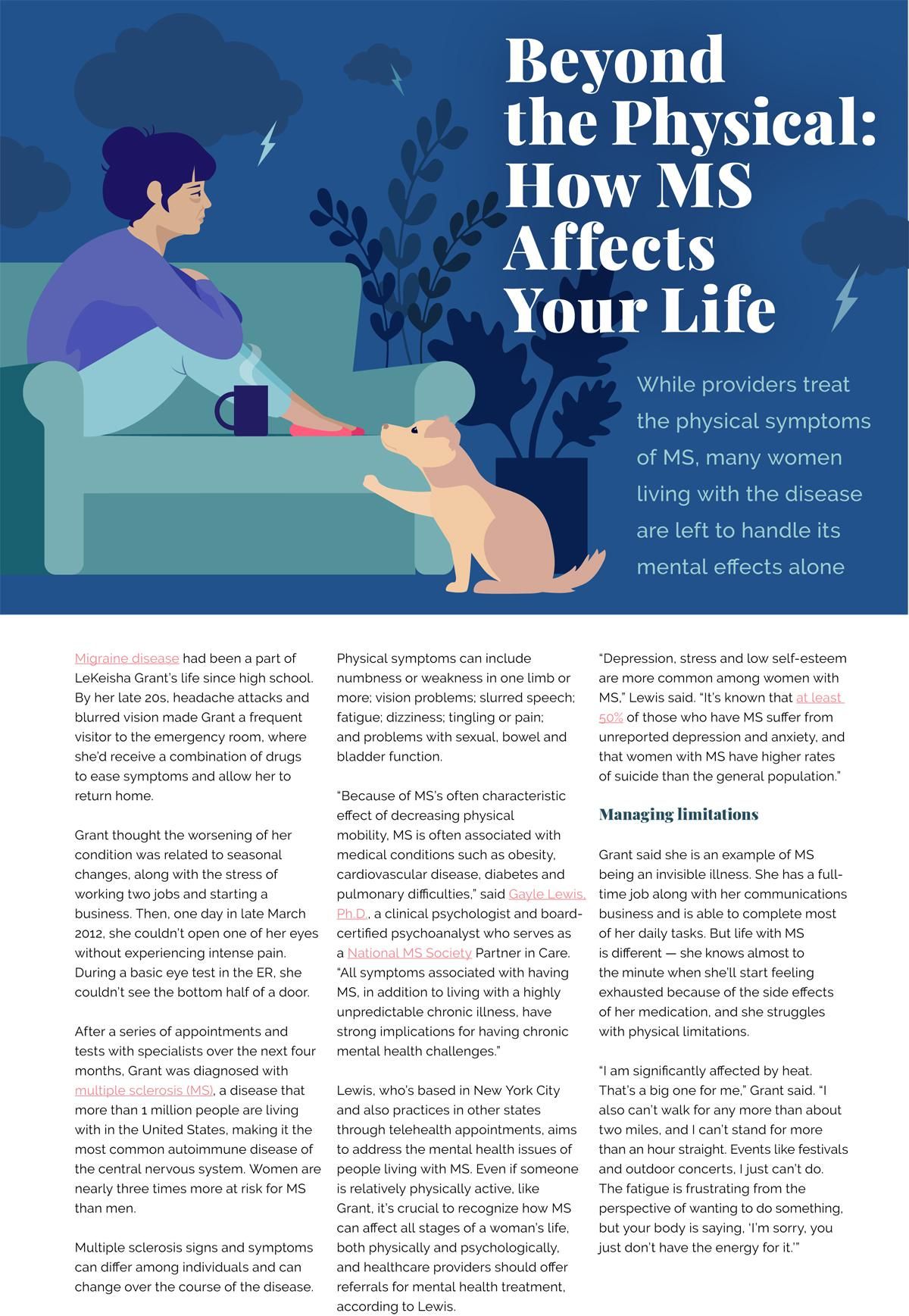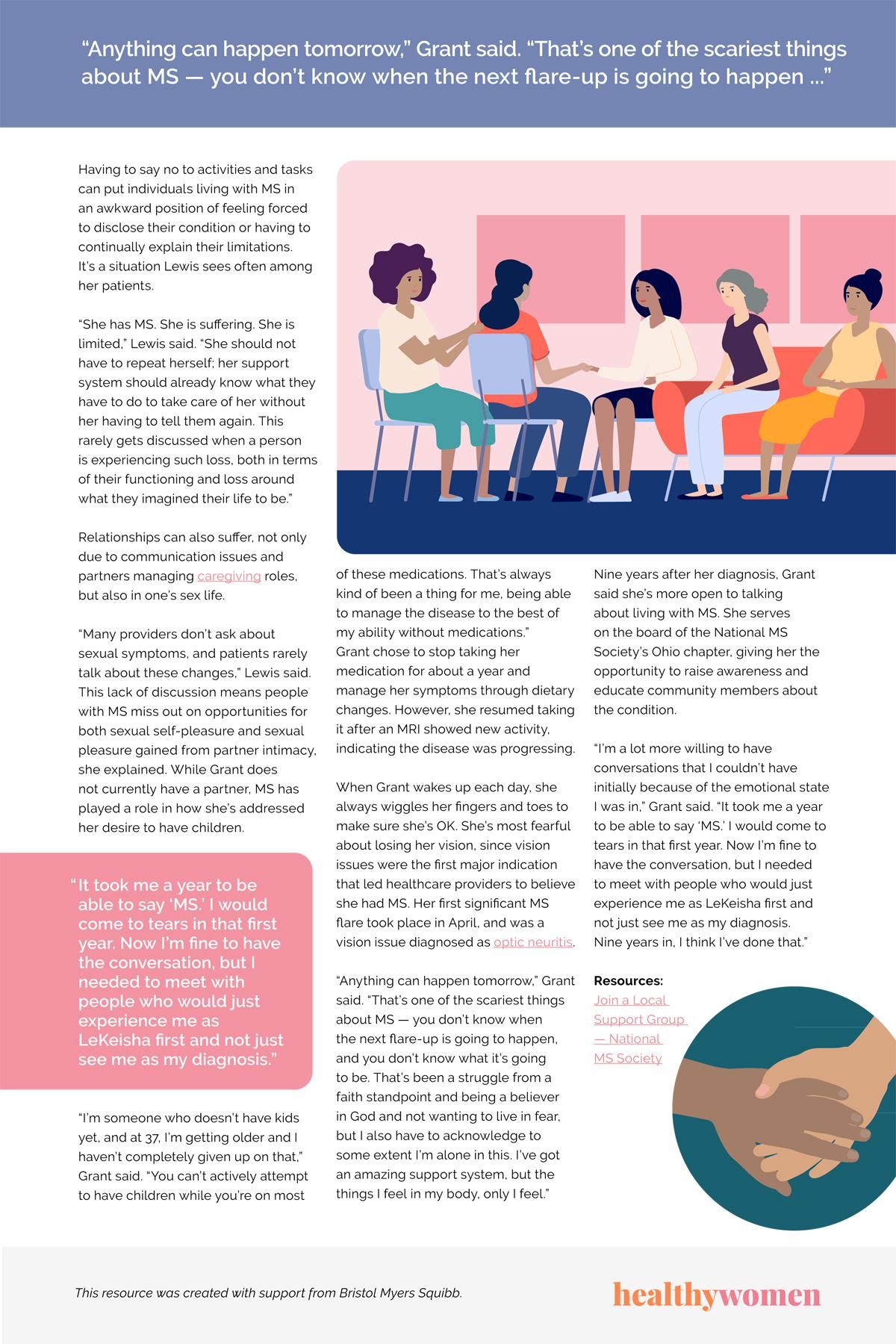Migraine disease had been a part of LeKeisha Grant’s life since high school. By her late 20s, headache attacks and blurred vision made Grant a frequent visitor to the emergency room, where she’d receive a combination of drugs to ease symptoms and allow her to return home.
Grant thought the worsening of her condition was related to seasonal changes, along with the stress of working two jobs and starting a business. Then, one day in late March 2012, she couldn’t open one of her eyes without experiencing intense pain. During a basic eye test in the ER, she couldn’t see the bottom half of a door.
After a series of appointments and tests with specialists over the next four months, Grant was diagnosed with multiple sclerosis (MS), a disease that more than 1 million people are living with in the United States, making it the most common autoimmune disease of the central nervous system. Women are nearly three times more at risk for MS than men.
Multiple sclerosis signs and symptoms can differ among individuals and can change over the course of the disease. Physical symptoms can include numbness or weakness in one limb or more; vision problems; slurred speech; fatigue; dizziness; tingling or pain; and problems with sexual, bowel and bladder function.
“Because of MS’s often characteristic effect of decreasing physical mobility, MS is often associated with medical conditions such as obesity, cardiovascular disease, diabetes and pulmonary difficulties,” said Gayle Lewis, Ph.D., a clinical psychologist and board-certified psychoanalyst who serves as a National MS Society Partner in Care. “All symptoms associated with having MS, in addition to living with a highly unpredictable chronic illness, have strong implications for having chronic mental health challenges.”
Lewis, who’s based in New York City and also practices in other states through telehealth appointments, aims to address the mental health issues of people living with MS. Even if someone is relatively physically active, like Grant, it’s crucial to recognize how MS can affect all stages of a woman’s life, both physically and psychologically, and healthcare providers should offer referrals for mental health treatment, according to Lewis.
“Depression, stress and low self-esteem are more common among women with MS,” Lewis said. “It’s known that at least 50% of those who have MS suffer from unreported depression and anxiety, and that women with MS have higher rates of suicide than the general population.”
Managing limitations
Grant said she is an example of MS being an invisible illness. She has a full-time job along with her communications business and is able to complete most of her daily tasks. But life with MS is different — she knows almost to the minute when she’ll start feeling exhausted because of the side effects of her medication, and she struggles with physical limitations.
“I am significantly affected by heat. That's a big one for me,” Grant said. “I also can't walk for any more than about two miles, and I can't stand for more than an hour straight. Events like festivals and outdoor concerts, I just can't do. The fatigue is frustrating from the perspective of wanting to do something, but your body is saying, ‘I'm sorry, you just don't have the energy for it.’”
Having to say no to activities and tasks can put individuals living with MS in an awkward position of feeling forced to disclose their condition or having to continually explain their limitations. It’s a situation Lewis sees often among her patients.
“She has MS. She is suffering. She is limited,” Lewis said. “She should not have to repeat herself; her support system should already know what they have to do to take care of her without her having to tell them again. This rarely gets discussed when a person is experiencing such loss, both in terms of their functioning and loss around what they imagined their life to be.”
Relationships can also suffer, not only due to communication issues and partners managing caregiving roles, but also in one’s sex life.
“Many providers don’t ask about sexual symptoms, and patients rarely talk about these changes,” Lewis said. This lack of discussion means people with MS miss out on opportunities for both sexual self-pleasure and sexual pleasure gained from partner intimacy, she explained.
While Grant does not currently have a partner, MS has played a role in how she’s addressed her desire to have children.
“I’m someone who doesn't have kids yet, and at 37, I’m getting older and I haven’t completely given up on that,” Grant said. “You can’t actively attempt to have children while you’re on most of these medications. That’s always kind of been a thing for me, being able to manage the disease to the best of my ability without medications.”
Grant chose to stop taking her medication for about a year and manage her symptoms through dietary changes. However, she resumed taking it after an MRI showed new activity, indicating the disease was progressing.
When Grant wakes up each day, she always wiggles her fingers and toes to make sure she’s OK. She’s most fearful about losing her vision, since vision issues were the first major indication that led healthcare providers to believe she had MS. Her first significant MS flare took place in April, and was a vision issue diagnosed as optic neuritis. “Anything can happen tomorrow,” Grant said. “That’s one of the scariest things about MS — you don’t know when the next flare-up is going to happen, and you don’t know what it’s going to be. That’s been a struggle from a faith standpoint and being a believer in God and not wanting to live in fear, but I also have to acknowledge to some extent I’m alone in this. I’ve got an amazing support system, but the things I feel in my body, only I feel.”
Nine years after her diagnosis, Grant said she’s more open to talking about living with MS. She serves on the board of the National MS Society’s Ohio chapter, giving her the opportunity to raise awareness and educate community members about the condition.
“I’m a lot more willing to have conversations that I couldn’t have initially because of the emotional state I was in,” Grant said. “It took me a year to be able to say ‘MS.’ I would come to tears in that first year. Now I’m fine to have the conversation, but I needed to meet with people who would just experience me as LeKeisha first and not just see me as my diagnosis. Nine years in, I think I’ve done that.”
Resources:
Join a Local Support Group — National MS Society
This resource was created with support from Bristol Myers Squibb.
- Important Questions to Ask About Multiple Sclerosis - HealthyWomen ›
- What You Need to Know About Multiple Sclerosis - HealthyWomen ›
- Fact Facts: Everything You Need to Know About Multiple Sclerosis ... ›
- HealthyWomen's Multiple Sclerosis (MS) Support Group Finder ... ›
- Multiple Sclerosis - HealthyWomen ›
- Work Stress and Multiple Sclerosis - HealthyWomen ›
- MS and Sex - HealthyWomen ›
- La EM y el sexo - HealthyWomen ›
- MS and Women of Color - HealthyWomen ›
- Tips for Living with Multiple Sclerosis (MS) - HealthyWomen ›
- How MS Affects the Body - HealthyWomen ›
- En qué forma afecta el cuerpo la EM - HealthyWomen ›
- Consejos para una vida con esclerosis múltiple (EM) - HealthyWomen ›
- La EM y las mujeres de color - HealthyWomen ›









